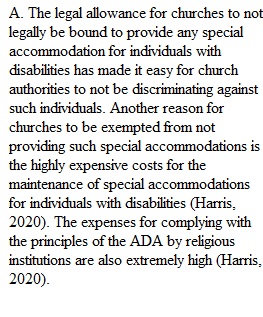


Q Instructions A. Among the many exemptions afforded religious institutions, one of them is that they do not need to comply with the ADA in making buildings accessible. Research the issue and provide arguments for and against this exemption. (50 points) B. Read the following article, and answer these questions: (50 points) https://www.counterpunch.org/2020/07/31/whats-next-for-the-ada/ Title: What’s next for the ADA by Jill Richardson in Counterpunch, July 31, 2020 1. What are your reactions to the article? 2. Is the author correct in stating that universal design would prevent the stigmatization of persons with disabilities? 3. Research the concept of universal design. Define it then analyze the advantages and disadvantages. 4. Respond to the following: What is the underlying cultural attitude that stigmatizes and marginalizes persons with disabilities? As the author suggests, would the implementation of universal design change or eliminate this underlying attitude? (Hint: Is there “universal” acceptance, in a true sense of all persons regardless of their individual differences?
View Related Questions